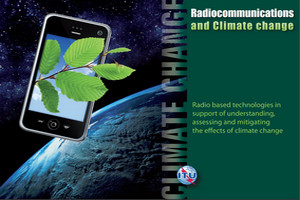
The recent economic crisis shows the crucial role of efficient and productive use of limited natural resources, such as biomass, biosphere, mineral resources, and water to stimulate sustainable economic development. Climate change has been labelled as the "defining challenge of our time". Its impact is already evident and will intensify over time if left unaddressed. There is overwhelming scientific evidence, that climate change will threaten economic growth, long term prosperity and social welfare of practically all countries, as well as the very survival of the most vulnerable populations.
ICTs and radiocommunications in particular are essential tools in the combat against climate change. Areas foreseen in this context include: continued observations and long-term monitoring of solar activity to improve our knowledge and understanding of the influence of the electromagnetic radiation from the sun on Earth´s environment, including climate; continued observations to characterize changes in the atmosphere, oceans, and land surface, and the use of such information for climate change modelling; and continued observations of the change in the ozone layer and its effects on the environment and human health. Land cover change assessment and understanding of its dynamics are recognized as essential requirements for sustainable management of natural resources, environmental protection, food security, climate change and humanitarian programmes. Terrestrial and satellite radiocommunication systems contribute to the monitoring of carbon emissions, the changing of ice in polar caps and glaciers, and temperature changes. Another key aspect is the application of modern radiocommunication system's to increase productivity, optimize energy consumption and reduce transportation costs leading to reduced levels of CO2 emissions.
ITU-R mission
ITU-R creates the regulatory and technical bases for the development and effective operation of satellite and terrestrial climate monitoring and data dissemination systems. It does so by: allocating the necessary radio-frequency spectrum and satellite orbit resources; analysing compatibility between new and existing satellite systems; carrying out studies and developing international standards for space-based and other radiocommunication systems and networks; and providing guidance and support on the use of satellite and terrestrial systems for environmental monitoring, and for prediction and mitigation of the negative effects of disasters caused by climate change. Table below specifies scope of ITU-R studies for Climate Change:
|
Monitoring the environment |
Satellite observations of the Earth's atmosphere and surface
The acquisition, processing, analysis and distribution of data from remote sensing satellites |
Earth exploration-satellites
Meteorological satellite |
|---|
|
Space operation |
|---|
|
Solar radio monitoring |
Radioastronomy
Space research |
|---|
| Ground observation of atmosphere characteristic | Meteorological aids |
| Radionavigation |
| Mobile systems |
| Other applications | Construction optimisation
Traffic optimisation
Energy, water and fuel savings
Planting decision, irrigation planning
Disseminating alert messages, coordination of relief activities and advice to public | Earth exploration-satellites |
| Mobile systems |
| Radionavigation |
| Broadcasting |
| Satellite |
| Amauters |
United Nations Secretary-General Antonio Guterres said, “The climate emergency is a race we are losing, but it is a race we can win. The climate crisis is caused by us and the solutions must come from us. We have the tools: technology is on our side”
WRC-19
The World Radiocommunication Conference (WRC-19) adopted:
-
RESOLUTION 647 (REV.WRC-19) Radiocommunication aspects, including spectrum-management guidelines, for early warning, disaster prediction, detection, mitigation and relief operations relating to emergencies and disasters
-
RESOLUTION 657 (REV.WRC-19) Protection of radio spectrum-reliant space weather sensors used for global prediction and warnings
RA-19
Radiocommunication Assembly 2019 (RA-19) adopted a number of Resolutions asking ITU-R to conduct appropriate studies, in particular:
- RESOLUTION ITU-R 55-3 - "ITU studies of disaster prediction, detection, mitigation and relief"
- RESOLUTION ITU-R 60-2 - "Reduction of energy consumption for environmental protection and mitigating climate change by use of ICT/radiocommunication technologies and systems"
- RESOLUTION ITU-R 61-2- “ITU-R’s contribution in implementing the outcomes of the World Summit on the Information Society and the 2030 Agenda for Sustainable Development”
Presentations
- ITU Session on frontier ICTs for climate action, Geneva, Switzerland, October 2019
- Climate Change Conference (COP-17), Durban, South Africa, 2011
-
ITU-T SG 5 meeting, Seoul, Korea, 2011
-
United Nations inter-agency meeting on outer space activities, Geneva, Switzerland, 2011
-
7th ITU Symposium on ICTs, the Environment and Climate Change, Montreal, Canada, 2012
-
WSIS Forum 2012, Geneva, Switzerland, 2012
-
Climate Change Conference (COP-18), Doha, Qatar, 2012
-
8th ITU Symposium on ICTs, the Environmant and Climate Change, Turin, Italy, 2013
-
ITU Regional Workshop for the CIS countries on the Role of ICT in Saving Lives, Issyk-Kul, Kyrgyz Republic, 2013
Relevant Web pages
- Environment and climate change
- UN Climate Change Conferences
- ITU News Magazine, special edition on ‘Monitoring our changing planet’: Critical spectrum for Earth observation from space
-
Second ITU/WMO Seminar
"Use of Radio Spectrum for Meteorology: Weather, Water and Climate Monitoring and Prediction", ITU Headquarters, Geneva, Switzerland, 23 to 24 October 2017 -
First ITU/WMO Seminar
"Use of Radio Spectrum for Meteorology: Weather, Water and Climate Monitoring and Prediction", WMO Headquarters, Geneva, Switzerland, 16-18 September 2009 - ITU Seminar for Americas Region Science services: regulatory, technical and practical implications - Manta, Ecuador, 20-21 September 2012
-
WMO Statement on the Status of the Global Climate
-
Radio Frequencies for Weather, Water and Climate Monitoring and Prediction
-
NASA and Global Climate Change
- Using radiocommunication to monitor climate